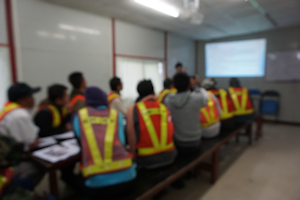How Devaluing the Safety Industry Hurts Everyone

Learning about safety can be hard work. Determining your industry specific needs, picking a training facility, and scheduling time to take courses, all take time and money. It can be exhausting. Increasing the value of a safety training program requires a delicate balance – safety comes first, but you want cost-effective and convenient training. Treating safety instruction as a commodity instead of a service destroys value for everyone. You get what you pay for, and cheap prices lead to cheap training. We have a responsibility to treat our customers and workers with more respect than that.
Respect determines the nature of our relationships. Safety training is a relationship between the trainers, the material, and the learners. When we ignore these relationships, the pillars become unstable and the standard of care crumbles.
Respect is the pillar that ensures a standard of care, and fosters a state of excellence throughout the safety training industry. These relationships are put in jeopardy when we shift toward rock-bottom pricing for safety products and services. Unrealistic price competition decreases the value of service and diminishes respect. The learner may get a lower price for the product, but the training company, trainers, course designer, and equipment provider receive less as well – devaluing their expertise, knowledge, and craft.
Devalued trainers and course providers lead to devalued content. Quality instructors are forced to cut corners through low quality delivery, poor technology, equipment, and methods. They have no choice but to leave for greener pastures as resources dwindle.
The result is a wholesale nightmare, where safety training is treated as a commodity instead of a service: Sparsely qualified instructors teaching low-quality material to mass groups as a strategy to maintain meager profit margins.
In short, commoditization.
What is Commoditization?

Business Dictionary defines commoditization as “almost total lack of meaningful differentiation in the manufactured goods.” It tends to happen with cheaper technology, standardized methods, and competitive pricing. This is a natural part of marketing. Companies are welcome to compete on price. But price competition has dangers. What happens when quality and reliability are sacrificed for a cheaper offering? The innate value of products or services will suffer. Sometimes this is OK. You might want to buy a low-quality point & shoot camera for a vacation. Or you might settle for a no-touch car wash and save the premium detailing for another day. It’s a different story when it comes to safety.
Lives are not disposable, and we do not compromise.
Commoditization Leads to Devaluation

Excessive commoditization is common in many trades. For example, contractors will often low-ball construction work to secure contracts. The rest of the contractors know that they can’t possibly make money doing the same work. They are forced to cut corners or go out of business. Reputable businesses who charge value-based prices lose market share and are only called in to clean up the mess that others have left behind.
The 2008 financial crisis was due in-part to the commoditization of housing loans. As banks sold tons of high-risk mortgages, cheap securities flooded the market. Devaluation of these securities could only be hidden by a bunk rating system. The whole thing collapsed once investors learned about the devaluation that had occurred under the guise of a booming economy.
Matt Tiabbi, a journalist for Rolling Stone Magazine, claims that this kind of price manipulation is akin to criminal behavior. He points out how gain for a few can have devastating consequences for others. In this case, the consequence was mass economic instability. In the safety training industry, the consequence is putting workers in peril. We should aim to avoid this kind of devaluation at all costs.
Avoiding Devaluation

Healthy market competition does not have to result in devaluation. With the right strategy, companies can do good business and increase value for all stakeholders. Jeff Thull, the president and CEO of the management consulting firm Prime Resource Group, outlines how to avoid the commoditization trap using careful business strategies. He argues that a reliance on customer’s decision-making processes is ineffective. This is because the customer is uninformed. Uninformed customers have difficulty evaluating their needs and planning for long-term solutions. Price becomes the determining factor in the decision-making process.
Industry professionals have a responsibility to help the customer make informed choices and get proper service. When customers come to safety training providers, there is an expectation that they are in good hands and that they will receive the proper training. Put another way, the customer expects to be treated with respect.
The sentiment of respect is shared by other business leaders as well. Verne Harnish, founder of global non-profit Entrepreneurs’ Organization, confirms the importance of respect in Fortune Magazine. Harnish shows how respect for the customer and industry expertise boost business.
A focus on customer service and expertise represents a company’s commitment to its values. Respect for the customer alleviates the burden of making tough decisions. Now they can make purchases with confidence and contribute to a win-win arrangement – customers feel like they are ‘in good hands’ and providers gain loyal customers.
The “Three Rs” of Respect

Safety training is only effective when approached with respect:
- Respect for the trainer,
- Respect for the learner, and
- Respect for the material.
Respect for the Trainer

We need to respect the trainers because they are critical to successful learning. Trainers have industry specific insight and they set the tone of the course. They help identify learner needs and tailor the training to meet them. Trainers should be paid based on their value. Once the trainer has been devalued, the material and students end up devalued as well.
When you need open heart surgery, would you want an inexperienced surgeon? Or would you rather have someone who’s been in the industry for years and uses proven methods? When it’s you or your workers’ lives on the line, would you want a college intern teaching safety? Competent instructors are valuable because they know what it takes to keep people safe.
Good instructors are excellent communicators. They need to know what they are talking about, and have experience to back it up. Theory is great, but experience is better. Trainers must accommodate the people in the class by welcoming students and being aware of learner specific needs. The instructor must be able to answer questions and take constructive criticism. The instructor should be prepared and equipped with industry-best technology.
Training is complex, which makes good instructors hard to find. We encourage continuous trainer development by recognizing their value. Respecting the trainer will then translate into respect for the learners.
Respect for the Learner

Learners are important too! The purpose of the safety training course is to give learners new skills. After all, learners take time away from work and pay good money to receive quality education. They are not just ‘bums in seats’, and they deserve better than generic PowerPoint presentations.
Workers need industry specific training that leaves them with applicable skills. They have different learning styles that must be recognized and accommodated. Safety concepts need to be integrated into the workplace, and the only way this can happen is with in-depth learning. Respecting the learner’s needs helps make training successful.
Some learners enjoy reading. Others learn by listening or watching or doing. Because people are so different, it is important to incorporate in-person relationships. This way, material can be adapted to various learning styles and create a productive learning environment. Workers in different industries and positions need different training. There is no one-size-fits-all training.
That is why at Safety Coordination Services, we respect learners’ needs and train them with individualized activities.
Respect for the Material

A safety course is only as good as the material. The information must be complete, correct and organized. It is essential to set an industry standard and follow it. When we do not respect the industry standard and best training practices, the quality drops and workers are put at risk.
A learner should never have to wonder about the quality of the course material Industry standard certifications are the living promise that the training they receive is correct, current, and effective.
Upholding the Pillars of Respect

Consider the consequences of poor training. People are our most valuable asset, because they allow our businesses to operate. If we want to do business well, we need to put people first, and protect them at all costs.
Effective safety training relies on the pillar of mutual respect. To keep that pillar strong, we must maintain an appreciation for the value of everyone involved. Commoditization can be a tempting strategy to achieve short term gain. But once the pillars are weakened, the system begins to collapse, and people suffer for it.
We have a responsibility to avoid the damaging effects of devaluation. Effective business strategy starts with a commitment to provide excellent services and meet customers’ needs. This commitment will boost business, build meaningful relationships, and create a culture of trust.
When safety is not taken seriously, everyone pays. Personal integrity and responsibility must remain at the center of the safety training process.
For some more straight talk about this topic, watch for a vlog post coming soon from Jacques Rochefort, President of Safety Coordination Services.
